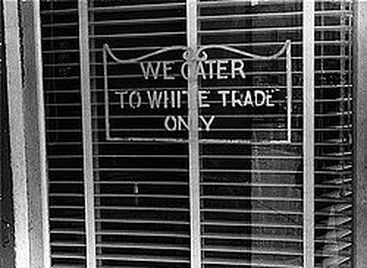Should People Be Free to Discriminate
Should we be free to discriminate? The question is essentially an oxymoron. In order for real freedom to exist society needs to be tolerant of alternative points of view. That would include allowing for the free expression of unpopular ideas. So, if a church feeds the poor without discrimination, which many readily do, but has a policy of not hiring people who are gay because of deeply held religious beliefs, they are well within their right to do so. That is, until President Obama's most recent use of executive power. At least that is the case where a private institution, like a church or private school receives government funds. It's highly unlikely that General Electric or Boeing, both of which receive government money, discriminate on the basis of sexual orientation. It would serve no purpose to do so, except, possibly, to undermine their bottom line.
What this executive order really does is give the government greater authority to regulate institutions who may discriminate on the basis of religious convictions. In other words, it's an attempt to revisit the Hobby Lobby decision indirectly, using executive power to bypass the courts.
Why did the government generally have a hands off policy regarding such matters? Because the church's activity in feeding the poor or providing education was deemed a greater benefit to society than any potential harm caused by their private hiring practices. It was also viewed as a case of the
government not wishing to step beyond the normal bounds of governmental authority in a pluralistic society. Likewise, it needs to be remembered that the government has no funds beyond the taxes it takes from private citizens. If it gives some of that money back in the form of contracts, it only does so because the money was taken by threat of force (jail, prosecution, fines etc.) to begin with. In point of fact, the government is only redistributing “The People's” money back to the people. The government did not create the money, although admittedly, it increasingly does just that, which is a different conversation.
What this change in the law does is give the government greater power to determine what it views as discrimination in terms of a companies hiring practices—and then discriminate against anyone who disagrees. For instance, can a Jewish school that receives some government support be forced to hire a radical Muslim. Or, conversely, make a conservative Muslim school hire a devout Jew; a Christian, a homosexual, an Atheist, etc.. This may sound ridiculous, but, a long life has taught me that what seems absurd today, can easily be viewed as the common wisdom in short order.
More importantly, there are numerous organizations that provide much needed charity that the government can simply punish if it chooses to, and for purely political reasons. The historical record makes this all to clear. The net result will likely be less charity overall, which is not a good thing. All of the above should make for caution, and it has, until recently. That is why deeming it a good and godly thing because it sounds good, may not be as simple as it seems. When it comes to the law, it almost never is.
Mark Magula
What this executive order really does is give the government greater authority to regulate institutions who may discriminate on the basis of religious convictions. In other words, it's an attempt to revisit the Hobby Lobby decision indirectly, using executive power to bypass the courts.
Why did the government generally have a hands off policy regarding such matters? Because the church's activity in feeding the poor or providing education was deemed a greater benefit to society than any potential harm caused by their private hiring practices. It was also viewed as a case of the
government not wishing to step beyond the normal bounds of governmental authority in a pluralistic society. Likewise, it needs to be remembered that the government has no funds beyond the taxes it takes from private citizens. If it gives some of that money back in the form of contracts, it only does so because the money was taken by threat of force (jail, prosecution, fines etc.) to begin with. In point of fact, the government is only redistributing “The People's” money back to the people. The government did not create the money, although admittedly, it increasingly does just that, which is a different conversation.
What this change in the law does is give the government greater power to determine what it views as discrimination in terms of a companies hiring practices—and then discriminate against anyone who disagrees. For instance, can a Jewish school that receives some government support be forced to hire a radical Muslim. Or, conversely, make a conservative Muslim school hire a devout Jew; a Christian, a homosexual, an Atheist, etc.. This may sound ridiculous, but, a long life has taught me that what seems absurd today, can easily be viewed as the common wisdom in short order.
More importantly, there are numerous organizations that provide much needed charity that the government can simply punish if it chooses to, and for purely political reasons. The historical record makes this all to clear. The net result will likely be less charity overall, which is not a good thing. All of the above should make for caution, and it has, until recently. That is why deeming it a good and godly thing because it sounds good, may not be as simple as it seems. When it comes to the law, it almost never is.
Mark Magula
